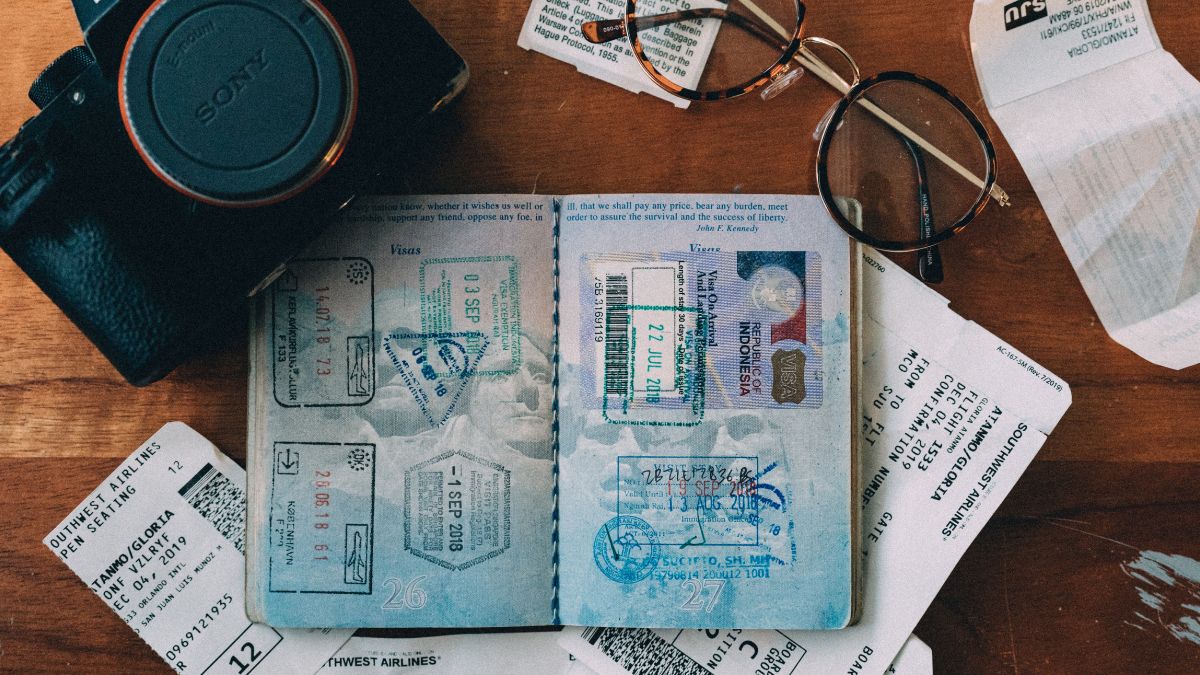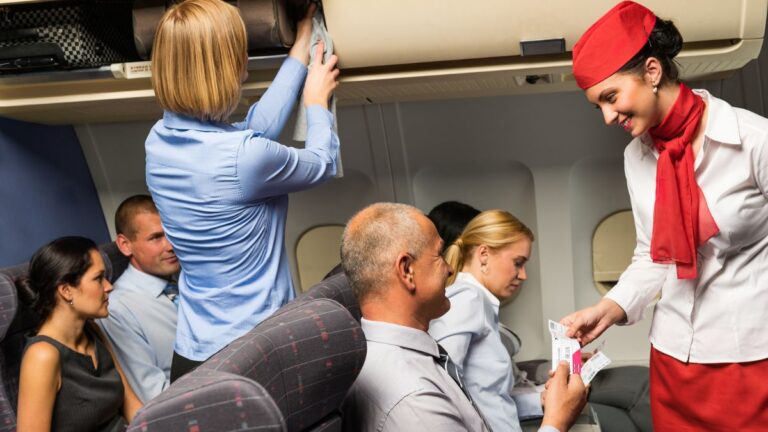What to Put for Occupation on Passport? Choosing the Right Option

As participants in Amazon Associates and other programs, we earn from qualifying purchases. This comes at no additional cost to you. For more details, see our Affiliate Disclosure.
Navigating the labyrinth of official forms and applications can often feel daunting, and when it comes to the seemingly simple question of ‘Occupation’ on your passport application, there may be more to consider than you initially thought. Your occupation, for many, is a straightforward aspect of their identity, but how do you encapsulate this in a passport? The answer isn’t always straightforward.
This article will shed light on the various factors you should consider when filling in your occupation on your passport application, guiding you towards making the choice that best suits your individual circumstances.
Understanding the Significance of ‘Occupation’ on Your Passport
The ‘Occupation’ field on your passport is more than just a routine part of your personal information. While it may seem like a simple question that requires a direct answer, its importance goes beyond that. The information provided in this section could impact various aspects of your travel experience and can sometimes even play a role in your admission to other countries.
Primarily, the ‘Occupation’ field serves as a demographic identifier, helping authorities to understand the nature of travelers crossing their borders. It also assists immigration and security officials in assessing risk profiles and validating your identity, based on their existing knowledge of work-related travel patterns. For instance, certain occupations might be more frequently associated with business travel, while others could align more with tourism.
In some cases, your stated occupation might influence visa decisions or the questioning you face upon arrival in a foreign country. Certain professions, especially those related to media, politics, or security, may raise more queries due to the sensitive nature of these jobs.
Thus, accurately representing your occupation on your passport can aid smooth transitions across borders and potentially minimize complications during your travels. It’s about more than just stating what you do—it’s a crucial part of your global identity. Understanding this significance can help you approach this seemingly simple question with more thought and consideration.
General Guidelines for Filling Out Occupation on Passport
While there’s no one-size-fits-all solution for what to write in the ‘Occupation’ field of your passport application, there are some general guidelines that can help you provide an accurate representation of your professional life:
- Be Truthful: This cannot be emphasized enough. It’s essential to state your real occupation, as misleading information can lead to unnecessary complications, or even legal consequences, during your travels or at immigration checkpoints.
- Use Common Terminology: It’s helpful to use widely recognized job titles, even if your actual job title is more unique or industry-specific. For instance, if your business card says ‘Digital Overlord’, it might be more appropriate to list your job as ‘Digital Marketing Manager’.
- Keep It Simple: Try to avoid using jargon or overly technical language. The aim is to communicate your occupation clearly to someone who may not be familiar with your industry or role.
- Stay Current: Your occupation should reflect your current employment status, not your future plans or past jobs. If you’ve recently switched jobs, use your new role. If you’re currently unemployed, it’s okay to state that too.
- Freelancers and Self-Employed Individuals: If you’re self-employed or a freelancer, it’s appropriate to state that as your occupation. You can be more specific if you wish, such as ‘Freelance Writer’ or ‘Self-Employed Plumber’.
Remember, the ‘Occupation’ field is there to provide an accurate snapshot of your professional identity to authorities when necessary. It’s not an opportunity to embellish, over-complicate, or misrepresent. The best course of action is to be clear, concise, and truthful.
Listing More than One Occupation: Is it Possible?
Yes, it’s possible to list more than one occupation on your passport, particularly if you have multiple jobs or roles that are integral to your professional identity. However, bear in mind that space is often limited on application forms, so you’ll need to be succinct.
If you’re in a situation where you hold two or more distinct roles, the best way to approach this is to include the occupation that is most relevant or takes up the majority of your time. For example, if you’re a part-time teacher and a full-time engineer, it would be appropriate to list ‘Engineer’ as your occupation.
For those who evenly split their time between two jobs, consider which occupation is more related to your travel purposes. If you are travelling for a business meeting related to your job as a sales executive, even though you also work part-time as a yoga instructor, it might be wise to list ‘Sales Executive’ on your passport.
Alternatively, you can combine roles if they fit within the allotted space. An example might be ‘Graphic Designer & Illustrator’.
Ultimately, the decision on what to list relies on your individual circumstances, and while it’s possible to list more than one job, it is important to remember that clarity and honesty should be your guiding principles. Your goal is to provide an accurate picture of your professional life without causing unnecessary confusion.
How to List Self-Employment or Freelance Work
Self-employment and freelance work are increasingly common in today’s flexible job market, and it’s important to know how to represent these types of employment on official documents like your passport.
If you’re self-employed, you can simply write “Self-Employed” followed by your specific profession. For example, if you run your own plumbing business, you can put “Self-Employed Plumber”. This not only indicates your self-employment status, but also provides insight into your specific line of work.
Freelancers can take a similar approach. You might write “Freelance” followed by your area of expertise. For instance, if you do freelance graphic design, you can put “Freelance Graphic Designer”.
For both self-employed individuals and freelancers, you can specify your industry or profession without going into the details of your exact job functions. The idea is to give a clear, general idea of what you do.
Finally, for those operating a registered business, it’s also appropriate to list the official job title you hold within your company, such as “CEO” or “Business Owner”, followed by the industry you’re in. It’s all about providing a truthful and understandable representation of your employment status and professional role.
Handling Unemployment or Retirement: A Special Note
At certain stages in life, such as during periods of unemployment or retirement, you may find yourself wondering how to accurately depict your occupational status on your passport. This is completely normal and there are appropriate ways to handle these situations.
Unemployment
If you’re currently unemployed, it’s important to be honest about your status. It’s perfectly acceptable to write “Unemployed” in the occupation field. Avoid the temptation to write your previous job title, as this could be misleading. It’s important to remember that being unemployed won’t impact your ability to get a passport or to travel.
Retirement
If you’re retired, you can simply put “Retired” as your occupation. If you’d like to be more specific, you can mention your last held position before retirement, for example, “Retired Teacher” or “Retired Engineer”. This gives immigration officials an idea of your career background while accurately reflecting your current status.
Students and Homemakers: Defining Your Occupation
Whether you’re a student immersed in academia or a homemaker dedicated to managing your household, you may wonder how to define your occupation when filling out passport forms. Both roles require hard work and commitment, but they don’t fit the traditional definition of an ‘occupation.’ Here’s how to represent these roles appropriately:
Students
If you’re a student, it’s perfectly acceptable to list “Student” as your occupation. If you want to provide more details, you can specify your major or area of study, such as “Medical Student” or “Engineering Student”. This accurately reflects your current status and provides a snapshot of your focus area.
Homemakers
For homemakers, “Homemaker” is an appropriate term to use for the occupation field on your passport. This term is widely understood and accepted, and it rightly acknowledges the importance of managing a home and caring for a family.
Pitfalls to Avoid When Filling in Your Occupation
While filling in your occupation on your passport application might seem like a simple task, there are some common pitfalls that you’ll want to avoid to ensure a smooth application process and trouble-free travels. Let’s look at what these are:
- Providing False Information: It’s crucial to always provide truthful information about your occupation. Providing misleading or false information is not just unethical, but could also lead to serious legal consequences.
- Using Uncommon or Misleading Job Titles: While it might be tempting to use a unique or trendy job title, it’s best to stick with commonly recognized titles that accurately reflect your role. Job titles that are difficult to understand could lead to unnecessary confusion or suspicion.
- Being Vague or Inaccurate: Your occupation should be clearly and accurately stated. Being vague (e.g., ‘Consultant’ without any industry specification) or overly detailed (e.g., listing all tasks and responsibilities of your job) can lead to complications.
- Not Updating Your Information: If there’s a significant change in your employment status—like moving from employment to unemployment, switching careers, or retiring—it’s essential to update this information on your passport.
- Ignoring Unpaid Work: If you’re a student, homemaker, or volunteer, don’t be hesitant to list these roles as your occupation. All kinds of work, paid or unpaid, are valued and should be accurately represented.
Avoiding these pitfalls will help ensure that your occupation is accurately and appropriately represented on your passport, smoothing the way for hassle-free travels.
Updating Your Occupation: When and How?
Updating your passport to reflect a change in occupation isn’t as urgent as updating it for a change in name or appearance. Generally, you aren’t required to update your passport immediately when your occupation changes. However, it’s a good practice to have the information as up-to-date as possible, especially if you travel frequently for work and your new job title could have implications on your travel.
Here’s how to go about updating your occupation:
- Wait Until Renewal: The easiest way to update your occupation is to do so when your passport is up for renewal. Simply fill in your current occupation on the renewal form.
- Update Now: If you want to update your passport before the renewal date, you’ll typically need to go through the same process as applying for a new passport. Check your local government’s passport agency for the specific procedure.
Providing accurate and updated information can help avoid potential misunderstandings or delays in your travels. So, while it’s not immediately necessary to update your passport when your job changes, it’s worth considering if your occupation significantly impacts your travel.
The Impact of Your Listed Occupation on Travel
While it may not be immediately obvious, the occupation you list on your passport can indeed have an impact on your travel experiences. The first point of consideration is that your occupation can affect how immigration officers perceive you. Certain professions may be seen as more likely to overstay visas or work illegally, while others may be seen as less risky.
For instance, if you work in an occupation that often involves international travel, such as a consultant or a journalist, this may prompt less scrutiny from immigration officers. In contrast, occupations that could be carried out without proper work visas in other countries might raise more questions about the purpose of your trip.
Another impact of your listed occupation could be seen in the visa application process. Some countries may require additional documentation or steps in the visa process for certain occupations, particularly if you work in media, research, or other fields that may involve sensitive information or interactions.
Lastly, your occupation could also be a factor in random security checks. Certain occupations might be flagged for additional security measures, either because they’re less common or because they’re seen as posing a potential risk.
In conclusion, the occupation you list on your passport can subtly but significantly shape your international travel experiences. This underlines the importance of accurately listing your occupation to ensure a smooth travel process. Remember, honesty is always the best policy when dealing with immigration and travel documentation.






